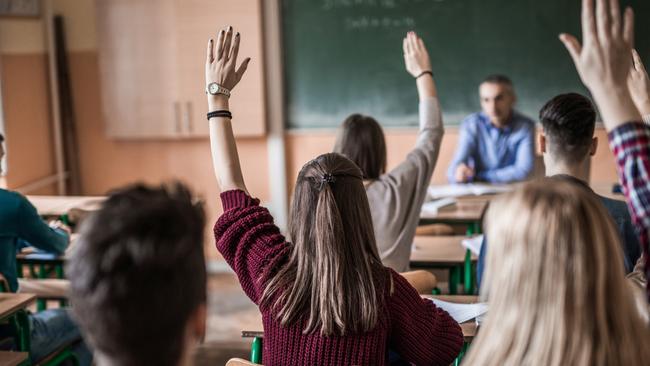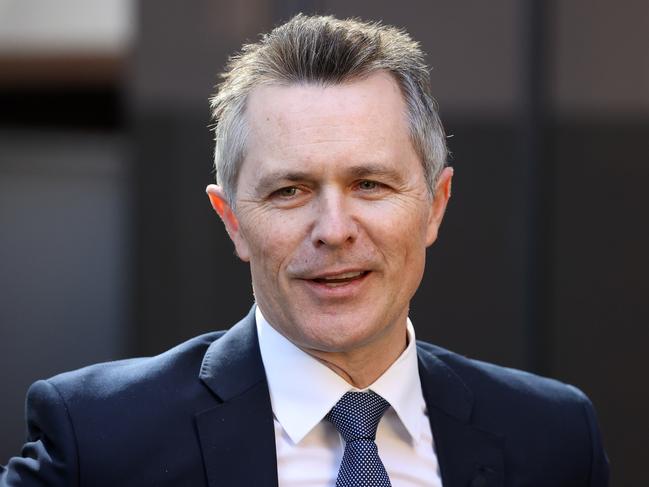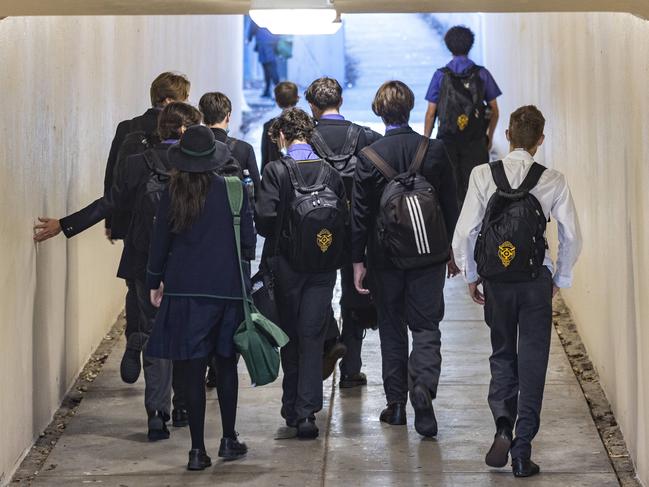PISA research shows record low scores for Australian students in maths, reading
A new report comparing the performance of students in 81 countries shows Australia has recorded a drastic decline. See why.

National
Don't miss out on the headlines from National. Followed categories will be added to My News.
The maths and reading skills of 15-year-olds have drastically declined over the past two decades, with the average Australian Year 10 student falling at least a year behind despite school funding tripling to $72bn.
Only an unprecedented drop in student performance overseas has saved Australia from plummeting down the list of 81 countries assessed in the OECD’s Programme for International Student Assessment (PISA).
Covid-enforced school closures, a massive rise in teacher shortages, widespread issues with digital device distractions, and almost one in two students struggling with motivation have all been blamed for Australia’s record low PISA scores on maths and reading.
The 2022 results of the premier global test, held for the first time since 2018, also reveal an alarming gender gap as boys lag behind on reading while girls fail to keep up on maths.
“Australia used to be one of the top-performing education systems, and that is no longer the case,” OECD education and skills director Andreas Schleicher said.
“It’s clearly gone in the wrong direction for many years.”
The Australian score in science increased slightly but remained 20 points below the performance of students in 2006 – the equivalent of the loss of a year’s worth of schooling.
In maths, the average score collapsed from 524 to 487 between 2003 and 2022, while the average reading result fell from 525 to 498.
Federal Education Minister Jason Clare said the results highlighted why a new school funding deal needed to tie investment to “the sort of things that help children who fall behind to catch up, keep up and finish school”.
“We have to fix the funding gap and fix this education gap,” Mr Clare said.
“Australia has a good education system, but it can be a lot better and fairer, and these results again highlight this.”

Australia’s 15-year-olds – 83 per cent of whom were in Year 10 when they sat the test last year – remained above the OECD average in each academic category, with the country’s global ranking rising to 16th in maths, 12th in reading and 10th in science.
But Mr Schleicher cautioned that the international leaderboard masked Australia’s “downward slope” in educational achievement.
Students in Singapore – the global leader across all categories – were more than four years ahead of their Australian counterparts in maths, more than two years ahead in reading and nearly three years ahead in science.
The decline in Australia was larger among low-performing students, with 26 per cent ranking at the lowest level for maths, 21 per cent for reading and 20 per cent for science.
That meant they were unable to complete tasks such as converting prices into a different currency, identifying the main idea in a text, or recognising the correct explanation for familiar scientific phenomena.

Mr Schleicher said the “relatively low level of self-motivation for learning” and above-average levels of digital device distraction in classrooms were key factors in Australia’s decline.
Only one in five students said they were not distracted by their own devices or those used by their peers, with the proportion complaining about the problem ranking well above the OECD average.
Mr Schleicher also questioned the productiveness of the investment by Australian governments in schools, which has soared from $23bn in 2003 to $72bn.
“For many OECD countries that spend more per student, there is no relationship between extra investment and student performance,” the report said.
Mr Schleicher pointed out that while student-staff ratios remained steady in Australia, the proportion of principals reporting teacher shortages skyrocketed from 17 per cent in 2018 to 61 per cent last year. One in five principals also raised issues with poorly qualified staff.
Of the 13,437 Australians students tested across 743 schools, 14 per cent were born overseas and 15 per cent were the children of parents who were born overseas.
While 41 per cent of immigrants spoke a language other than English at home, they recorded a 15-point advantage in reading over non-immigrant students, and a 24-point advantage in maths.

The PISA test also revealed that girls outperformed boys in reading by 22 points, and boys outperformed girls in maths by 11 points.
Mr Schleicher said this bucked the trend in other countries where the “gender gap in mathematics has basically closed”.
He blamed “gender stereotypes” in the workforce, with only a “very small share” of girls surveyed expressing interest in STEM-related careers.
“We should be concerned. The demands on young people in terms of mathematical skills are significantly rising. At the same time, education is not delivering,” he said.





